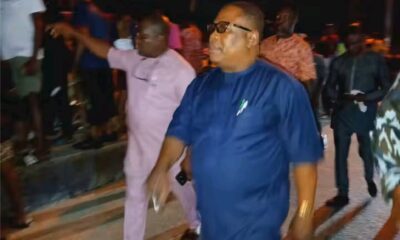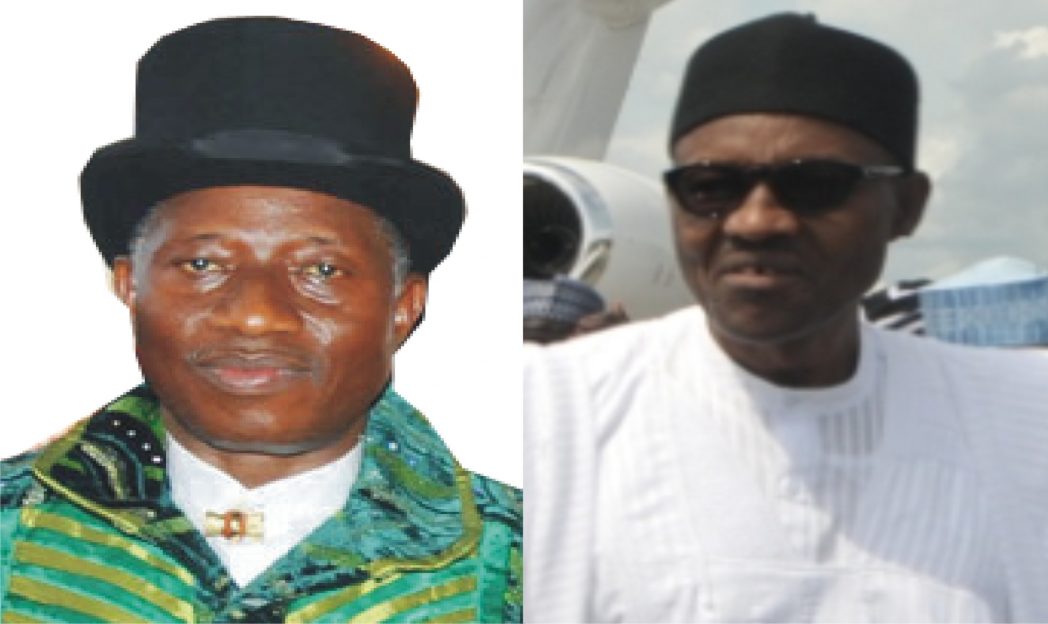Politics
2015 And Electoral Violence In Nigeria
There is no agreeable
‘definition of electoral violence. This is because of the contentious issue of “violence begets violence” developed by Frantz Fanon in the era of anti-colonial struggles. The Fanonian argument is predicated on the fact that ‘violence provokes violence’. So those who retaliate to the first violence of political opponent do not agree that they are perpetrating violence. They sirnply argue that they are countering violence.
From the array of definitions available, one can glean an operational definition. Operationally, electoral violence connotes all forms of violence (physical, psychological, administrative, legal and structural) at different stages engaged in by particiipants, their supporters and sympathizers (including security and election management body staff) in the electoral process. These forms of violence take place before elections, during elections and after or post-election, and could also be intra- or inter-party.
Since Nigeria became independent on October 1st 1960, the history of election has been written in violence. The Human Rights Watch (2007) in its follow up of post-independence events in Nigeria describes the nation’s post-independence history as being overshadowed by the depredations of a series of corrupt, abusive, and unaccountable governments. This description is apt because it appears that Nigerians seem to have acquired a culture of electoral violence as seven of the eight general elections conducted since independence in 1960 have been violence-ridden -1964/1965,1979,1983,1999,2003, 2007 and 2011.
For example, at independence, the country adopted a parliamentary system of government akin to the British type. The first post-independence election organized by that government led by Prime Minister Tafawa Balewa\President Nnamdi Azikiwe in 1964 and 1965 were characterized by widespread complaints of fraud, violence and intimidation. Protests in the wake of the regional elections, which in some areas degenerated into a violent exercise in competitive rigging, led to widespread violence and inter-communal rioting that claimed more than 200 lives.
Later in January 1966, the military struck and the fledging Nigerian democracy was thwarted by the action of its very own practitioners. From 1966, the military held sway until 1979 when they handed over to another civilian government headed by Alhaji Shehu Shagari of the National Party of Nigeria (NPN). The Shagari-Ied government organized a civilian to civilian transition election but again like its First Republic counterparts, repeated history and massively rigged the 1983 general elections through very violent means in connivance with the election management body, Federal Election Commission (FEDECO) and security forces. That again set the stage for the second wave of military intervention in the nation’s politics on December 31, 1983. The military from then remained in power until May 29, 1999 after, several attempts to democratize.
Suffice it to say that between independence in 1960 and 1999 when civilian rule was restored, Nigeria produced only two elected governments and both were overthrown in military coup de’tats before completing a second term in office. In all, Nigeria’s military ruled the country for nearly 30 of its first 40 years of independence, excluding the three months of short-lived Interim National Government (ING)
Since the restoration of civil rule, attempts have not been made by politicians to deepen and strengthen democracy. Instead, Nigeria has only added to its history fraudulent and violent elections. The 1999, 2003 and 2007 general elections that brought President Olusegun Obasanjo and later late President Umaru Yar’ Adua to power were marred by such widespread violence and fraud.
For example, the US-based Jimmy Carter Centre for Democracy which monitored the 1999 election as an international observer concluded its report on the outcome of the presidential election like the others before it thus: “It is not possible for us to make an accurate judgment about the outcome of the presidential election”. In the same vein, the 2003 elections were more pervasively and openly rigged than the flawed 1999 polls, and far more bloody.
These events set the stage for the 2007 elections which both domestic and foreign observers succinctly described as the worst in Nigeria’s history ranking among the worst conducted anywhere in the world in recent times. For instance, the US-based National Democratic Institute (NDI) stated in its post-election statement that the electoral process “failed the Nigerian people”.
The Human Rights Watch (2007) which monitored the election in its report said the Nigeria’s failed April 2007 polls cast a harsh and very public light on patterns of violence, corruption and outright criminality that have come to characterize Nigeria’s political system-and on the extent to which officials and institutions at all levels of government accept, encourage and participate in those abuses. The 2007 and 2011 general elections had come and gone with some cases still in courts, Nigerians .are afraid of future elections especially the 2015 elections that is a stone throw away.
There are plethora of reasons that account for the causes of electoral violence.
These include rigging, ineffectiveness of security forces and culture of impunity, partisan disposition of the security forces detailed to monitor elections, weak penalties against defaulters and poor handling of election petitions, among others.
It is true that electoral violence has characterized our political elections since independence. This trend can be reversed only if we can change our mindsets on what politics and governance is all about. Politics should not be conceived as the most lucrative industry in Nigeria. It is this mindset that makes aspirant or political office seekers to exhaust “all means” in capturing the position. It should be seen as a service to humanity and protecting the lives and the welfare of our prosperity.
Governance should be transparent at all levels. Electoral rules should be enforced. Political positions should be made unattractive by downward review of their take-home salary/allowances. Within our constituencies, we should be our brothers’ keeper. Electoral officials should devoid themselves of corrupt practices, while law enforcement agents should remain neutral. Politicians found parading thugs should be disqualified from the race. Violence free election is achievable in 2015
Being an excerpt of a public lecture delivered at the sensitisation/awareness campaign by the Rundele Peoples Assembly in Port Harcourt, recently.
Ben Thom-Otuya
Politics
Makinde Renames Polytechnic After Late Ex-Gov

Oyo State Governor, ‘Seyi Makinde, has renamed The Polytechnic, Ibadan as Omololu Olunloyo Polytechnic, Ibadan, in honour of a late former governor of the State, Dr Omololu Olunloyo.
Dr Olunloyo, who died on April 6, 2025, was the pioneer Principal of the Polytechnic, Ibadan, while he also served as Governor of Oyo State between October 1 and December 31, 1983.
Governor Makinde made the announcement at the state interdenominational funeral service held yesterday in honour of the late former governor at the Obafemi Awolowo Stadium, Liberty Road, Ibadan.
Governor Makinde said Dr Olunloyo lived an eventful life, adding that his attainment and personality could not be summarised in one sentence.
“He was not a man we could summarise in one sentence. He was a scholar, a statesman, a technocrat, a lover of culture and, above all, a man of deep conviction.
“While giving the exhortation, I was listening to Baba Archbishop Ayo Ladigbolu and he said in 1983, Baba became Governor of Oyo State. Though his time in office was brief, his election victory over a popular incumbent remains a powerful testament to the trust people gave him.
“I talked about preserving and digitising his library yesterday [Wednesday] as a mark of honour to Baba Olunloyo.
“Today, we will be giving Baba another honour to immortalise him. He was the first Principal of The Polytechnic, Ibadan; that institution will now be named Omololu Olunloyo Polytechnic, Ibadan.”
Earlier in his sermon, a retired Methodist Archbishop of Ilesa and Ibadan, Ayo Ladigbolu, described the late Olunloyo as a role model with intellectual inspiration and unassailable integrity.
The cleric said the deceased also demonstrated leadership in most superior quality during his lifetime.
In attendance were the state Deputy Governor, Chief Abdulraheem Bayo Lawal; wife of a former Military Governor of the old Oyo State, Chief (Mrs) Dupe Jemibewon; wife of a former Governor of Oyo State, Chief (Mrs) Mutiat Ladoja; former Deputy Governor and PDP Deputy National Chairman (South), Ambassador Taofeek Arapaja; and former Deputy Governor, Hazeem Gbolarumi.
Others were the member representing Ibadan North-East/South-East Federal Constituency, Hon Abass Adigun Agboworin; Chief of Staff to the Governor, Otunba Segun Ogunwuyi; Oyo State Exco members; Chairman of Oyo State Elders’ Council, Dr Saka Balogun; Chairman of All Local Government Chairmen in Oyo State, Hon Sikiru Sanda; President-General of the Central Council of Ibadan Indigenes (CCII), Chief Adeniyi Ajewole; religious leaders and family members, among other dignitaries.
Politics
10 NWC Members Oppose Damagum Over National Secretary’s Reinstatement
Ten members of the Peoples Democratic Party (PDP) National Working Committee (NWC) have countered the Acting National Chairman, Umar Damagum, on the reinstatement of Senator Samuel Anyanwu as National Secretary.
The dissenting members, led by the Deputy National Chairman ( South), Taofeek Arapaja, in a joint statement, said no organ of the opposition party could overturn the decision of the 99th meeting of the National Executive Committee (NEC).
The dissenting NWC members include Arapaja; Setonji Koshoedo, Deputy National Secretary; Okechukwu Obiechina-Daniel, National Auditor; Debo Ologunagba, National Publicity Secretary; Ologunagba; Woyengikuro Daniel, National Financial Secretary and Ahmed Yayari Mohammed, National Treasurer.
Others are Chief Ali Odefa, National Vice Chairman (South East); Emmanuel Ogidi, Caretaker Committee Chairman (South South); Mrs. Amina Darasimi D. Bryhm, National Woman Leader and Ajisafe Kamoru Toyese, National Vice Chairman (South West).
The group also insisted that contrary to the position of the acting National Chairman, the 100th NEC meeting of the party would be held on June 30 as earlier scheduled.
The statement read: “The attention of the National Working Committee (NWC) of the Peoples Democratic Party (PDP) has been drawn to a press briefing by the acting National Chairman, Amb. Umar Damagum, today Wednesday, June 25, wherein he attempted to overturn the resolution of the 99th National Executive Committee (NEC) meeting which scheduled the 100th NEC meeting for Monday, June 30.
“The acting National Chairman in the said press briefing also reportedly announced that Senator Samuel Anyanwu has been asked to resume as National Secretary of the party contrary to the resolution of the 99th NEC meeting, which referred all matters relating to the office of the National Secretary to the 100th NEC meeting.
“The pronouncements by the acting National Chairman have no foundation as no organ of the party (including the NWC), individual or group has the power to cancel, overrule, veto or vary the resolution of the National Executive Committee (NEC) under the Constitution of the PDP (as amended in 2017).
“For the avoidance of doubt, the NEC is the highest decision-making organ of the party, second only to the National Convention. By virtue of Section 31 (3) of the PDP Constitution, the resolution of the NEC to hold its 100th meeting on Monday June 30, is binding on all organs, officers, chapters and members of the party and no organ, group or individual can vary or veto this resolution of NEC.
“Furthermore, the claim by Damagum that Sen Anyanwu has been asked to resume office as the National Secretary of the party is, therefore, misleading being contrary to the resolution of NEC.
“In the light of the foregoing, the 100th NEC meeting as scheduled for Monday, June 30, has not been canceled or postponed.”
Politics
Presidency Slams El-Rufai Over Tinubu Criticism …Says He Suffers From Small Man Syndrome
The Special Adviser to President Bola Tinubu on Information and Strategy, Bayo Onanuga, has fired back at former Kaduna State Governor, Nasir El-Rufai, following the latter’s scathing criticism of President Tinubu’s administration and his 2027 re-election prospects.
In an interview on live television, Mallam El-Rufai said it would take a “miracle” for President Tinubu to be re-elected in 2027, citing an internal poll that purportedly shows a 91 percent disapproval rating for the president across key regions in the country, including the South-East and the North. He also claimed that President Tinubu’s disapproval rating in Lagos stood at 78 percent.
Reacting on Wednesday via a post on X (formerly Twitter), Mr Onanuga took a swipe at the ex-governor, quoting a harsh assessment of Mallam El-Rufai’s character from former President Olusegun Obasanjo’s memoir, My Watch.
“Nasir’s penchant for reputation savaging is almost pathological,” Mr Onanuga wrote, citing Chief Obasanjo’s words. “Why does he do it? Very early in my interaction with him, I appreciated his talent. At the same time, I recognised his weaknesses; the worst being his inability to be loyal to anybody or any issue consistently for long, but only to Nasir El-Rufai.”
The presidential adviser emphasised Chief Obasanjo’s remarks that Mallam El-Rufai often tries to elevate himself by diminishing others. “He lied brazenly, which he did to me, against his colleagues and so-called friends,” Mr Onanuga continued, quoting the former President. “I have heard of how he ruthlessly savaged the reputation of his uncle, a man who, in an African setting, was like a foster father to him.”
Chief Obasanjo, who appointed Mallam El-Rufai as the Minister of the Federal Capital Territory between 2003 and 2007, did not mince words in the memoir, describing Mallam El-Rufai as suffering from “small man syndrome.”
Mr Onanuga’s post is seen as a direct rebuttal to Mallam El-Rufai’s recent criticism and growing opposition role. The former governor is reportedly playing a central role in forming a new coalition to challenge President Tinubu in the 2027 general election.
In March 2025, El-Rufai officially dumped the All Progressives Congress (APC) and joined the Social Democratic Party (SDP), intensifying speculations about his 2027 political ambitions.
As the political rift deepens, Mallam El-Rufai remains one of the most vocal critics of the Tinubu administration, while Mr Onanuga and other presidential allies continue to push back against what they describe as “reckless” opposition rhetoric.
-
Sports4 days ago
I Joined Saudi League To Win Titles – Senegal Keeper
-

 Niger Delta4 days ago
Niger Delta4 days agoOBALGA Sole Administrator Presents Brand New Fire Extinguishers To Council …Commiserates With Traders Over Rumuomasi Market Fire Incident …Commences Desilting Of Drainages
-

 News4 days ago
News4 days agoWDD: Tinubu Seeks Global Action On Drug Abuse
-

 Featured4 days ago
Featured4 days agoTinubu Signs Four Tax Reform Bills Into Law …Says Nigeria Open For Business
-
Sports4 days ago
RSG Advises Rivers Angels, Players, Mgt To Work As A Team …Tasks Them To Win The Final
-
Nation4 days ago
FG Restates Commitment To Seafarers’ Welfare, Safety
-
Rivers4 days ago
Students Praise Old Boys/Girls 83 Set Over African Child Day Celebration
-

 Featured4 days ago
Featured4 days agoSenate Issues 10-Day Ultimatum As NNPCL Dodges ?210trn Audit Hearing


